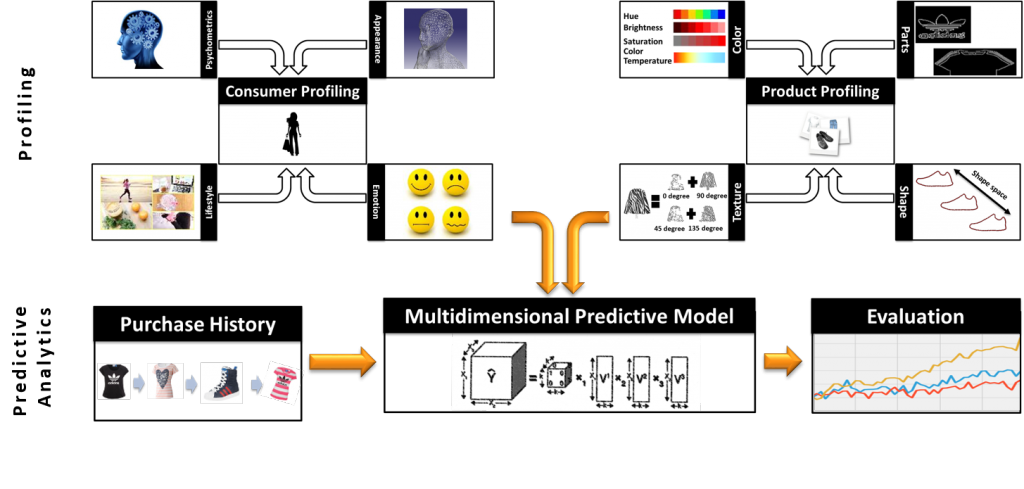Abstract
Fashion companies offer a large variety if products to their consumers with the objective to meet the fashion preferences as best as possible. Consumer behavior research indicates that large product offerings may lead to choice overload at the consumer resulting in losses in sale and an overall negative consumer experience. To mitigate the choice overload predictive models for product recommendation are applied to individually filter the product range according to the consumers estimated preferences. The fashion industry is one of the largest global consumer markets. Nevertheless only few research is available how to recommend especially fashion products in a highly accurate manner. Traditional recommender systems assume that the individual consumer preferences are static. On the opposite consumer behavior research shows that during the consumer purchase process contextual information have a significant influence on the final purchase. Therefore context-aware recommender systems emerged as a new subfield within the recommender research community having the goal to integrate relevant consumer context in the product preference predictions.
Research Picture
Research Objective
The overall research objective is to assess the impact of user and product profile attributes on the predictive performance of state-of-the-art algorithms for creating predictive models for product recommendation.
Therefore first relevant static and dynamic user profile information like personality, emotion, or appearance are identified which are relevant within the fashion purchase process. Beside this the visual appearance of the fashion products are integrated as well in the prediction model by extraction color and pattern information from the product images. The predictive power of these context and product attributes are then empirically evaluated by using factorization methods, especially tensor factorization methods.
Company contacts
- adidas AG
Related Student Reports (excerpt)
-
Clothing recommendation based on Rocchio’s algorithm – design and prototypical implementation
(Dustin Nguyen; Bachelor Thesis; 2015) -
Design und Durchführung einer Studie zur Evaluation einer innovativen Kleidungsvisualisierung
(Jana Bernotat; Bachelor Thesis; 2015) -
Empirische Untersuchung zur Kundenakzeptanz von Kleidungsempfehlungssystemen im E-Commerce
(Vanessa Bloss; Bachelor Thesis; 2015) -
Derivation and evaluation of product attributes for enabling advanced business analytics
(Katharina Blümel; Master Thesis; 2015) -
Design and implementation of a database for storing and analyzing body scans of consumers
(Andreas Lutz; Master Thesis; 2015) -
Design and implementation of advanced information visualizations of consumer and product data at the example of a sporting goods company
(Hüseyin Kocabey; Master Thesis; 2015) -
Automatisierte Farbanalyse von mehrfarbigen Produktbildern – Konzeption und prototypische Implementierung
(Max Neubauer; Bachelor Thesis; 2015) -
Extraktion von Kundenmeinungen zu Produktmerkmalen aus Social Media Daten mithilfe von Natural Language Processing am Beispiel der Sportartikelindustrie
(René Götz; Bachelor Thesis; 2015) -
Identifikation der aktuellen Herausforderungen in der Modebranche aus Customer-Relationship-Management Perspektive
(Maximilian Küchler; Bachelor Thesis; 2015) -
Herleitung eines Konzepts zur personalisierten Ansprache durch Marketingbilder auf Basis neurowissenschaftlicher Erkenntnisse zur visuellen Wahrnehmung
(Florian Mayer; Bachelor Thesis; 2015) -
Herleitung eines Konzepts zur Nutzung von Persönlichkeitsmerkmalen von Konsumenten für die individualisierte Kundenansprache im Kontext der Bekleidungsindustrie
(Sabine Armbruster; Bachelor Thesis; 2015) -
Big Data vs. Traditionelle Marktforschung! Möglichkeiten und Grenzen der Datenintegration im Kontext des analytischen CRM am Beispiel der Automobilindustrie
(Christoph Wortmann; Master Thesis; 2015) -
Daten-basierte Identifikation von Kleidungskombinationsregeln
(Luisa Kirschbaum; Bachelor Thesis; 2014) -
Interaktive Visualisierung von Kleidungsprodukten im E-commerce – Ausarbeitung und prototypische Implementierung
(Matthias Hille; Bachelor Thesis; 2014) -
Brand Analytics – Herleitung eines Konzepts zur gezielten Unterstützung des Markenmanagement durch Business Analytics
(Kim Svenja Leszinski; Bachelor Thesis; 2014) -
Design und Implementierung von Meinungsklassifikationsverfahren basierend auf Open Source Libraries
(Jens Neumann; Bachelor Thesis; 2014) -
Literaturbasierte Identifikation und Strukturierung von Konsumenten-Typologien und Einflussgrößen beim Kauf von Kleidungsprodukten
(Anita Doris Ludwig-Müller; Bachelor Thesis; 2014) -
Herleitung einer strukturierten Übersicht von Einflussfaktoren auf den Konsumenten beim Onlinehandel von Kleidung
(Veronika Golubinski; Bachelor Thesis; 2014) -
Herleitung eines Modells zur Klassifikation von Kleidungsprodukten anhand von visuellen Faktoren
(Sina Kleinhenz; Bachelor Thesis; 2014) -
Herleitung eines Frameworks zur Evaluierung von Kleidungsempfehlungssystemen
(Nina Merz; Bachelor Thesis; 2014) -
Empirische Ermittlung affektiver und kognitiver Faktoren von Konsumenten bei Kleidungsprodukten
(Silke Neusatz; Bachelor Thesis; 2014) -
Farbbasierte Bildklassifikation von Kleidungsprodukten – Konzeption und prototypische Implementierung
(Bernhard Schuster; Bachelor Thesis; 2014) -
Empfehlungssysteme für Modeprodukte – eine Literature Review
(Dilara Yesilbas; Bachelor Thesis; 2014) -
Ableitung von Erfolgsfaktoren von Social Media Daten zur Nutzung in der Marktforschung am Beispiel der Sportartikelindustrie
(Anne-Kathrin Reif; Bachelor Thesis; 2014) -
Enterprise Content Management and Personalization in the Digital Marketing Context: state-of-the-art Analysis at the example of a global acting sporting goods company
(Felipe Villaveces; Master Thesis; 2014) -
Explorative Analyse des Nutzenpotenzials von Bildern im Web 2.0 für die Kreativität von Produktdesignern
(Jil Krachenfels; Bachelor Thesis; 2014) -
Derivation of an holistic marketing intelligence framework at the example of a global acting sporting goods company
(Alexandre Lagüe-Jacques; Master Thesis; 2014) -
Lokalisierung von Sportlern anhand georeferenzierter Bilddaten im Rahmen des Geomarketing
(Philipp Neuner; Bachelor Thesis; 2014) -
Automated Sports Recognition in Images
(Yongquan Ding; Master Thesis; 2014) -
Concept development and implementation of a recommendation system on outfits
(Qinwen Sun; Master Thesis; 2014) -
Unlocking the potential of Social CRM: Building rich Customer views
(Kathrin Geck; Bachelor Thesis; 2013) -
Automated detection of brand-relevant images using image mining techniques
(Wenzhou Xue; Master Thesis; 2013) -
Herleitung eines Modells für die Klassifikation von Bildern für das Marketing am Beispiel der Sportartikelindustrie
(Dana Hasselbruch; Bachelor Thesis; 2013) -
Prototypische Implementierung und Evaluation eines Logo-Recongition Systems basierend auf Local Features
(Aleksandr Rapoport; Bachelor Thesis; 2013) -
Spatial and temporal data mining and visualization of color trends in a global sporting goods manufacturer
(Alejandra Maya Madrid; Master Thesis; 2013) -
Ermittlung und Validierung von Key Performance Indikatoren für das Social Media Monitoring
(Vanessa Schaffranietz; Master Thesis; 2012) -
Nutzenpotentiale der Analyse und Visualisierung spatio-temporaler Marketingdaten
(Julia Credé; Bachelor Thesis; 2012) -
Nutzenpotentiale marketingrelevanter Daten aus sozialen Netzwerken
(Julia Meixner; Bachelor Thesis; 2012)

